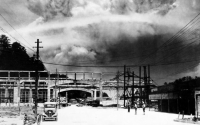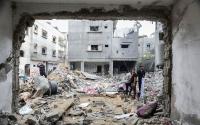Ian Black
European Union leaders are facing an almighty bust-up over the new constitution at their Brussels summit but whatever else happens they will agree on an important document that spells out their view of the world and its ills.
The summiteers are rubber-stamping the EU's security strategy (ESS) - the first ever attempt to define its approach to global threats so it will in future be better able to get its own act together.
The crisply-written, 4,000-word paper - A Secure Europe in a Better World - was born in the dark days of the Iraq crisis , when Donald Rumsfeld, the US defence secretary, attacked "old" Europe and Chris Patten, the EU external relations commissioner, hit back at America's "unilateralist overdrive".
It was an extremely serious confrontation - revived this week by th e US decision that only countries which supported the war could bid for lucrative contracts to reconstruct Iraq.
Quietly, though, something positive did come of that stormy time - memorably described as a "a near-death experience" by the US ambas sador to Nato.
Taken the bitter divisions between EU member states, Javier Solana, the union's ponderously-named high representative for common foreign and security policy, found he had little to do - and made good use of his enforced idleness.
Turning a crisis into an opportunity, Solana and his top aide, the British diplomat Robert Cooper, set out three key objectives for the EU:
1. Contributing to stability and good governance in Europe's immediate neighbourho od
2. Building an international order based on effective multilateralism
3. Tackling the threats, old and new.
Even exploring these issues was a novelty for some countries. Nato's European allies had looked beyond the cold war and had bee n through the Kosovo conflict in 1999. But that had not made them reflect in depth on possible threats beyond Europe ("out of area" in Nato jargon), think much about the role of the UN, or consider the tools available before launching military action.
The exercise also forced neutral or non-aligned EU countries like Ireland, Finland and Austria, and even that reluctant warrior Germany, to ponder the dangers posed by weapons of mass destruction, al-Qaida type transnational terrorism, failed or "rogue" states, and, above all, the use of force. The combination of Osama bin Laden and George Bush clearly required something new.
It was no longer enough, observed Carl Bildt, a former Swedish prime minister, to talk abou t Europe's "soft power" versus the "hard power" of an unassailably mighty America. It was necessary to show how and in what circumstances Europe's power could actually be used, and how an expanded union - soon to have 25 members - could exercise global responsibility commensurate with its economic weight and ambitions.
The clever thing about this unusually acronym-free strategy paper is that it keeps everybody happy while also breaking new ground. It takes a holistic view of security - talking about hunger and underdevelopment as causes of instability and conflict.
It mentions the effect of climate change and energy dependence as well as the link between failed states and organised crime - familiar from the Balkans, Somalia and Afghanistan. And it highlights the importance of conflict prevention - always cheaper than any cure.
But it also takes a hard look at the newer threats of terrorism and WMD (and, crucially, the possible nexus between the two) - the issues at the heart of American's post 9/11 and post-Saddam preoccupations. Europe did not want to be accused in future of burying its head in the sand: thus the more robust line it has taken in recent months over Iran's nuclear ambitions.
The ES S had the desired effect of demonstrating to the Americans that the EU was starting to think about these issues in a more hard-nosed way - as well as stating baldly: "The transatlantic relationship is irreplaceable."
Inevitably, the document doe s not answer every tough question. If Europe wants to punch at its weight in the world, then surely it should end the anomaly of separate permanent seats at its "top table" - the UN security council - for Britain and France, the nuclear-armed victors of the second world war, and replace them with a single EU seat?
Nor does it directly address the sensitive question of pre-emption, which lies at the heart of the "axis of evil" security doctrine propagated by the neo-cons ervatives who surround Bush. And the phrase "pre-emptive engagement" in an early draft became a less threatening "preventive engagement" in the final version.
"If we want international organizations, regimes and treaties to be effective in confro nting threats... we should be ready to act when their rules are broken," it ventures mildly.
Yet despite modest EU peacekeeping or police missions in Macedonia, Congo and Bosnia, progress has been painfully slow and European military spending rem ains sluggish: things may improve with new defence provisions in the constitution.
Critics have complained that the ESS is too close to an American view of the world in subordinating poverty reduction to a "war on terror" whose importance, they argue, has been exaggerated.
"Coherence is now the buzz-word for EU foreign policy," commented a coalition of British development charities. "But if development aid is used as an instrument for counter-terrorism or trade policy, then that coherence comes at the expense of the world's poor. Aid cannot substitute for sustained political engagement in conflict or crisis, nor become the financial muscle for promoting Europe's self-interest. Europe needs a credible development poli cy, not a subordinated and marginalised one."
If the EU approach is novel and thought-provoking it still runs a serious risk of producing only paltry results. "If it had been full of radical ideas the security strategy wouldn't have got the posit ive reception it did," admitted one Brussels diplomat.
He added: "It wasn't bland but it was carefully calibrated to find the maximum common ground without ending up with a lowest common denominator that said nothing. The key now is to ensure that we take forward the analysis and deliver policies that will enable us to carry out the strategy."






